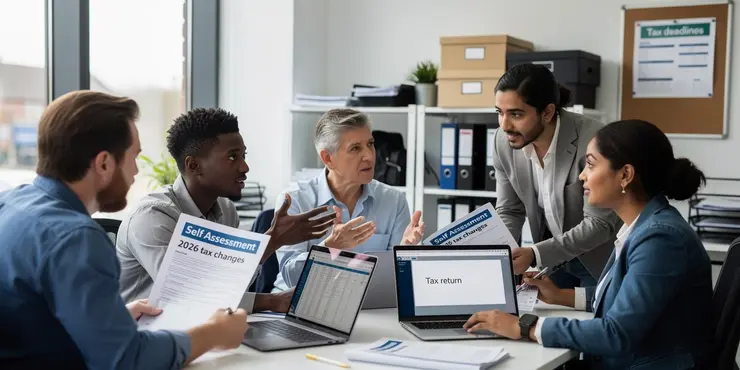
Find Help
More Items From Ergsy search
-
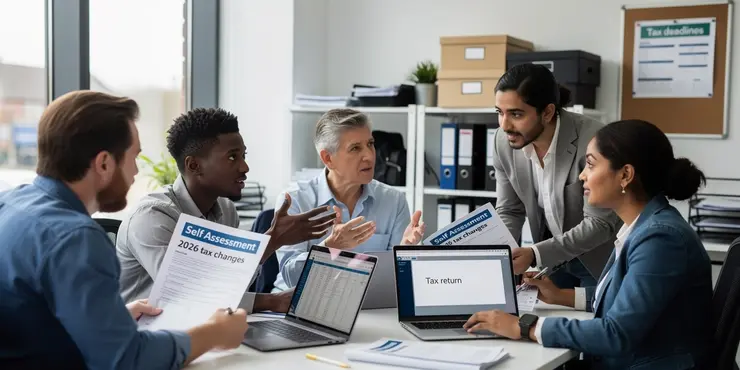
How are self-assessment taxpayers affected by the 2026 changes?
Relevance: 100%
-
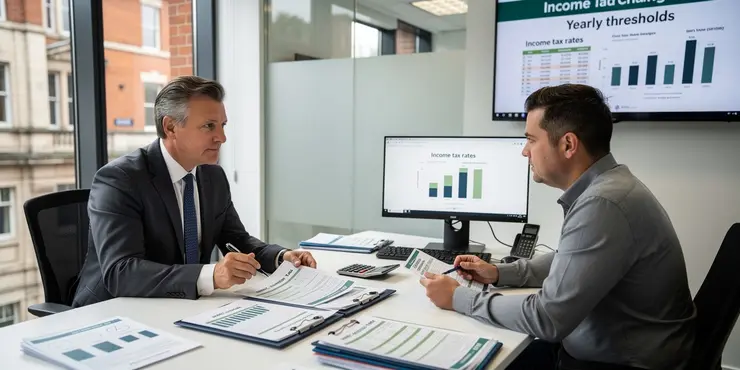
What are HMRC Income Tax Changes in April 2026?
Relevance: 50%
-

How might these changes affect taxpayers on PAYE?
Relevance: 43%
-

What are the HMRC income tax changes coming into effect in April 2026?
Relevance: 42%
-

How will dividend taxation change in April 2026?
Relevance: 40%
-

Will there be a change in the additional rate threshold in April 2026?
Relevance: 38%
-
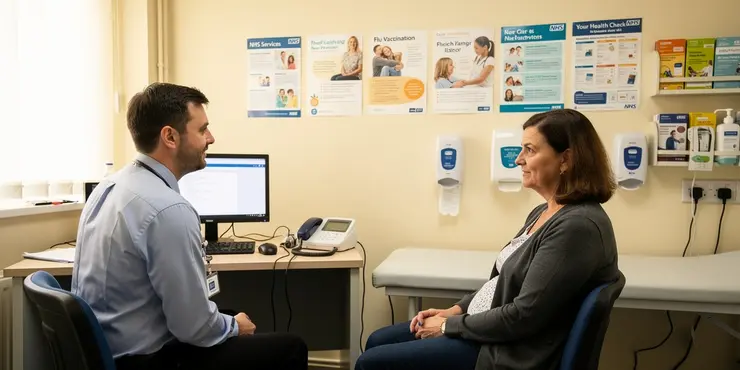
Are there expected changes to capital gains tax in 2026?
Relevance: 38%
-
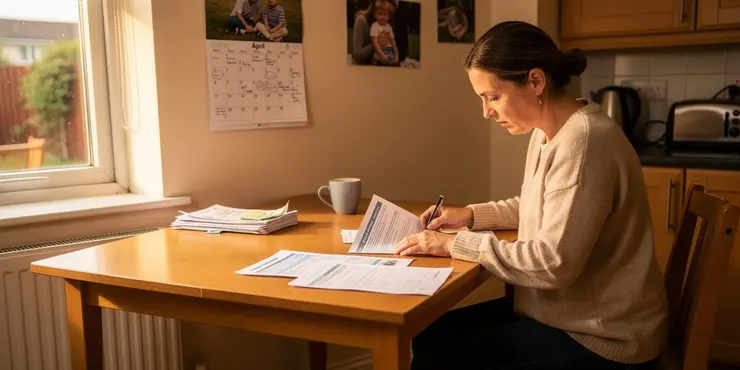
Are there changes expected for tax credits in April 2026?
Relevance: 37%
-

Will income thresholds for tax reliefs be revised in 2026?
Relevance: 37%
-

Are there further changes expected after 2026?
Relevance: 37%
-
Has the process for adoption changed in 2026?
Relevance: 36%
-

Will personal savings allowances be updated in 2026?
Relevance: 36%
-

How soon should I prepare for the 2026 tax changes?
Relevance: 35%
-
Are there any changes to spousal support regulations in 2026?
Relevance: 35%
-
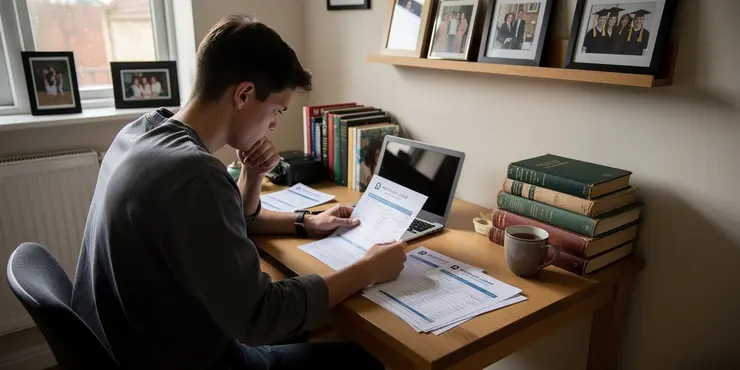
Are there implications for student loan repayments with 2026 changes?
Relevance: 35%
-
What are the changes to Family Court Law in 2026?
Relevance: 34%
-
Have the rules for changing a child's name in family court changed in 2026?
Relevance: 34%
-
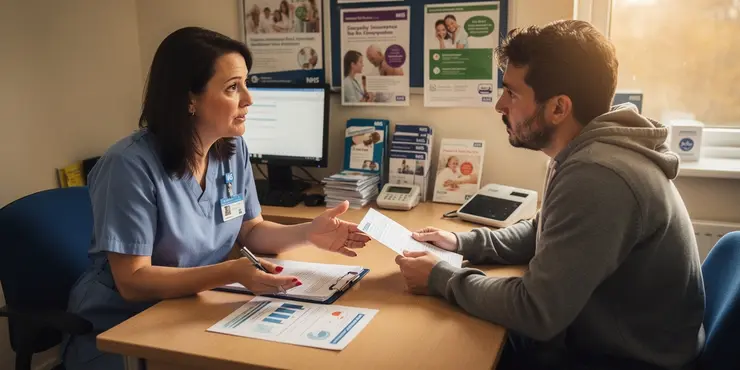
Is there a change in National Insurance rates for 2026?
Relevance: 34%
-
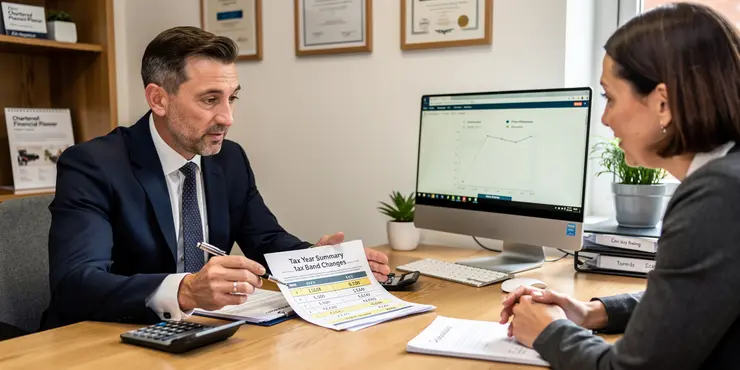
Are there any planned changes to tax bands for April 2026?
Relevance: 34%
-
What is the impact of the 2026 changes on grandparent visitation rights?
Relevance: 34%
-

What are the state pension age changes in 2026 in the UK?
Relevance: 33%
-

Are there any changes to the state pension age in 2026?
Relevance: 32%
-
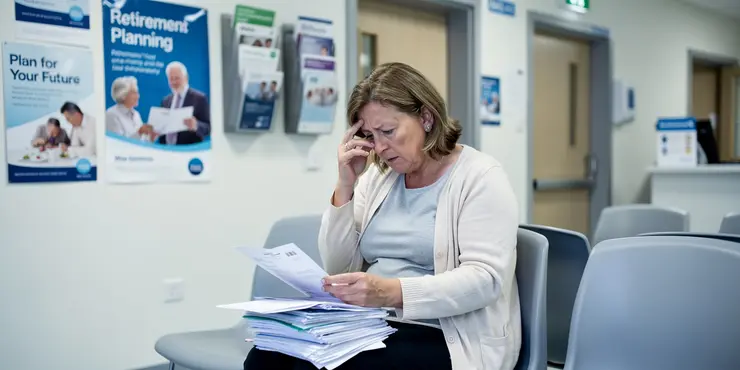
Who will be affected by the state pension age changes in 2026?
Relevance: 32%
-
How have child custody laws changed in 2026?
Relevance: 32%
-

Will the personal allowance be altered for the 2026 tax year?
Relevance: 31%
-
How have prenup agreements been affected by the 2026 family court changes?
Relevance: 31%
-
Are there any changes to surrogacy arrangements under the 2026 family court law?
Relevance: 30%
-

Will pension contribution allowances be affected in 2026?
Relevance: 30%
-
Have the rights of same-sex couples been affected by the 2026 family court changes?
Relevance: 30%
-
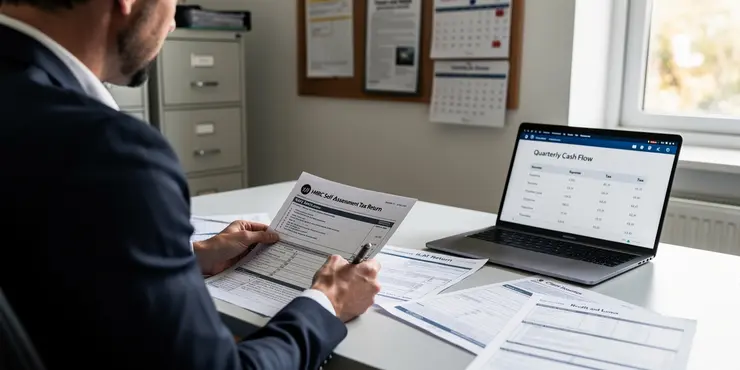
What should business owners expect from income tax changes in 2026?
Relevance: 28%
-

Could there be a reduction in the basic rate of income tax by 2026?
Relevance: 28%
-

Will climate change affect the 2026 flu season?
Relevance: 27%
-
Are there any new requirements for divorce filings in 2026?
Relevance: 27%
-
What changes have been made to mediation in family law cases in 2026?
Relevance: 27%
-

What is the state pension age in the UK in 2026?
Relevance: 26%
-

DWP State Pension Age Changes 2026
Relevance: 26%
-
How has child support calculation been updated in 2026?
Relevance: 25%
-
Are there modifications to legal aid access in family court for 2026?
Relevance: 25%
-
What are the key changes to family court law in 2026?
Relevance: 25%
-

How important is it to get a flu vaccine in 2026?
Relevance: 24%
Introduction to the 2026 Changes for Self-Assessment Taxpayers
The UK government recently announced significant changes to self-assessment tax procedures, which will take effect in 2026. These changes are part of an ongoing effort to modernize tax administration within the UK and are expected to have a substantial impact on self-assessment taxpayers. Understanding these changes is crucial for taxpayers to ensure compliance and efficient tax management.
Digital Tax Reporting
One of the most notable changes in 2026 is the introduction of mandatory digital tax reporting. Self-assessment taxpayers will be required to maintain digital records of their income and expenses. These records must be submitted to HM Revenue and Customs (HMRC) using compatible software. This shift to digital aims to streamline the tax submission process, reduce errors, and make it easier for taxpayers to keep track of their financial affairs.
Quarterly Reporting Requirements
Starting in 2026, self-assessment filers will need to submit quarterly tax updates instead of the current annual submission. This means taxpayers will have to report their earnings and expenses at regular intervals throughout the year. The move to quarterly reporting aims to provide HMRC with more timely data and improve tax compliance. Although this may initially increase the administrative burden, it could help taxpayers avoid surprises at the end of the tax year by providing a clearer picture of their tax liabilities throughout the year.
Changes to Accounting Basis
The reforms will also affect the accounting basis that self-employed individuals use. The traditional cash basis, suitable for smaller businesses, and accrual basis, traditionally used by larger operations, will face examination and potential modifications. This assessment aims to ensure taxpayers can select the method that best reflects their business operations while simplifying calculations for tax purposes. The specifics of these changes are still under discussion, but taxpayers should be aware that the chosen basis could impact the timing and amount of tax due.
Impact on Compliance and Penalties
The 2026 changes are expected to heighten compliance obligations for self-assessment taxpayers. With more frequent reporting and mandatory digital submissions, the likelihood of non-compliance penalties may increase. It is essential for taxpayers to familiarize themselves with the new digital tools and adhere to the updated reporting frequency to avoid fines. Additionally, HMRC plans to introduce support measures to help taxpayers transition to the new system, including guidance on selecting the appropriate accounting software.
Conclusion and Preparation
Overall, the 2026 changes present both challenges and opportunities for self-assessment taxpayers in the UK. While the increased reporting frequency and transition to digital submissions may initially pose challenges, they also offer a pathway to a clearer understanding of one's financial situation throughout the year. Taxpayers are encouraged to begin preparing for these changes by exploring digital solutions, understanding the new reporting requirements, and seeking advice from tax professionals if necessary. Early preparation will be crucial to navigating the transition smoothly and ensuring compliance with the new regulations.
Introduction to the 2026 Changes for Self-Assessment Taxpayers
The UK government is making changes to how people do their taxes. These changes start in 2026. The goal is to make tax processes better and easier. If you do self-assessment taxes, it is important to know what is changing so you can follow the rules and manage your taxes well.
Digital Tax Reporting
In 2026, everyone who does self-assessment taxes must use a computer for reporting. You will need to keep digital records of what you earn and spend. Then, you will send these records to HM Revenue and Customs (HMRC) using special software. Using computers will help make tax reporting faster and reduce mistakes. It will also help you to track your money better.
Quarterly Reporting Requirements
Starting in 2026, you will have to report your taxes every 3 months, not once a year. This means sharing your earnings and spending four times a year. The goal is to give HMRC more up-to-date information and help you stay on top of your taxes. Doing this more often might seem like more work at first, but it can help you see how much tax you owe throughout the year, so there are no surprises.
Changes to Accounting Basis
If you are self-employed, there will be changes to how you report your business money. Small businesses use the cash basis, while bigger businesses use the accrual basis. The government is looking at these rules to see how they can be better. They want to make sure everyone can choose the best method for their business. The details are still being discussed, but knowing the basics will help when changes come.
Impact on Compliance and Penalties
With these new changes, you will have to follow more rules. Reporting more often and using digital tools might mean more checks. If you do not follow the new rules, you might have to pay fines. It is important to learn how to use digital tools for taxes and know how often to report. HMRC will provide help to learn the new system, including picking the right software.
Conclusion and Preparation
The 2026 changes will be new and different for people who do self-assessment taxes. It might be hard at first, but using digital tools and reporting more often can help you understand your finances better over the year. You can start getting ready by finding out about digital tools, learning the new rules, and asking tax experts for help if you need it. Preparing early will make the change easier and help you follow the new rules.
Frequently Asked Questions
What are the 2026 changes affecting self-assessment taxpayers?
The 2026 changes refer to updates in tax regulations and filing processes that impact how self-assessment taxpayers declare their income and manage their tax obligations.
How will the 2026 changes impact tax filing deadlines?
The 2026 changes may adjust filing deadlines to provide taxpayers with more time to submit accurate returns, but specific details should be checked with the tax authority.
Will the 2026 changes affect the tax rates for self-assessment taxpayers?
Potential changes in tax rates may be part of the 2026 updates, and affected taxpayers should review the new tables or consult with tax professionals.
Are there new digital requirements for self-assessment in 2026?
There may be increased emphasis on digital filing and record-keeping, requiring taxpayers to use specific software or platforms.
What are the compliance requirements under the 2026 changes?
Taxpayers may need to provide additional documentation or meet new compliance standards, such as enhanced reporting of income and expenses.
How do the 2026 changes affect sole traders and partnerships?
Sole traders and partnerships might face specific provisions, with tailored guidance issued by the tax authority outlining their responsibilities.
Will there be assistance or resources from the government regarding the 2026 changes?
Yes, governments often provide resources such as help centers and guidance documents to assist taxpayers in understanding and complying with tax changes.
Do the 2026 changes introduce new penalties for non-compliance?
New penalties or adjustments to existing ones could be introduced to encourage compliance with the tax laws under the 2026 changes.
How should taxpayers prepare for the 2026 changes?
Taxpayers should stay informed, seek professional advice if needed, and ensure they understand the new requirements well before the changes take effect.
Are self-assessment forms changing with the 2026 updates?
There may be updates to self-assessment forms to accommodate new information requirements, and taxpayers should familiarize themselves with any changes.
How will the 2026 changes impact tax refunds for self-assessment taxpayers?
Changes may affect calculation methods or timelines for receiving refunds, requiring taxpayers to stay updated on processing times.
What should taxpayers do if they're unsure about the 2026 changes?
Consult with a tax advisor or the appropriate tax authority to gain clarity and ensure compliance with the new regulations.
Will the 2026 changes affect savings or investment reporting?
Yes, there might be updated rules regarding the declaration of savings and investments, possibly affecting self-assessment submissions.
Are there transitional rules for taxpayers affected by the 2026 changes?
Transitional provisions may be included to allow taxpayers time to adjust to the new requirements smoothly.
Will electronic payment options be updated with the 2026 changes?
Possibly, to facilitate ease of payment, there could be more electronic payment options introduced under the 2026 changes.
Do the 2026 changes alter the record-keeping requirements for taxpayers?
Yes, there may be new requirements or standards for maintaining records to support the information reported in self-assessment returns.
Are there any exemptions introduced in the 2026 changes for certain taxpayers?
There might be specific exemptions or relief measures for eligible taxpayers impacted by the new changes.
What are the consequences of not adhering to the 2026 changes?
Non-compliance can result in penalties, interest on unpaid taxes, or other legal consequences, stressing the importance of understanding the changes.
Will training sessions be available for understanding the 2026 changes?
Training sessions or workshops may be offered by tax authorities or professional organizations to help taxpayers understand and comply with the new regulations.
How can technology aid in adapting to the 2026 changes?
Technology can streamline filing processes, improve record-keeping, and ensure accuracy, making adoption of any new digital requirements easier.
What changes will happen in 2026 for people who do their own taxes?
If you do your own taxes, new rules are coming in 2026. These are changes in how you pay and report your taxes. Here's what to expect and how to get ready:
- Look out for new tax forms that might be easier to fill out.
- You might need to pay your taxes at a different time of year.
- Use simple apps or online tools to help you with your taxes.
- Ask someone you trust for help if you're unsure.
Remember, it's okay to ask for help from a friend, family member, or expert. You can also find online videos and guides that explain tax changes in a simple way.
In 2026, the rules about taxes are changing. These changes will show people how to report their money and pay the right amount of tax. This is important for people who do their own taxes.
What will happen to tax dates in 2026?
New rules in 2026 might give people more time to send their tax forms. Check with the tax office to know exactly what changes are coming.
Will the 2026 changes change tax for people who do their own taxes?
In 2026, the amount of money you pay in taxes might change. You should look at the new tax tables or talk to someone who knows a lot about taxes to help you understand.
Will there be new digital rules for self-assessment in 2026?
In 2026, there might be new digital rules for doing your own tax checks.
Here are some tips to help you:
- Use easy tax apps to guide you.
- Ask someone to help if you're unsure.
- Watch videos that explain what to do.
People might need to use computers more to keep tax records. They may have to use certain programs or websites to do this.
What do we need to do for the new rules in 2026?
People who pay taxes might need to show more papers or follow new rules. This can include telling more about the money they earn and what they spend.
To help with this, you can use simple tools like a calendar to track spending, or get help from a friend or family member.
What do the 2026 changes mean for sole traders and partnerships?
In 2026, some rules will change. These changes will affect people who work for themselves (sole traders) and some small businesses (partnerships).
Here is what you need to know:
- If you work alone or with others in a partnership, find out about the new rules.
- The changes might affect how you manage your money and pay taxes.
It's a good idea to talk to someone who knows about money, like an accountant. They can help you understand what to do next.
You can also use tools like calendars to mark important dates and calculators to check your finances.
People who work for themselves (sole traders) and people who work together in a business (partnerships) have special rules to follow. The tax office gives them advice on what they need to do.
Will the government help with the changes in 2026?
Yes, governments usually have places where people can get help. They also have easy-to-read guides to help people understand taxes and any new rules.
Will there be new punishments if you don't follow the 2026 rules?
If you don't follow the new 2026 rules, you might get in trouble.
Here are some ways to understand the rules better:
- Use pictures or symbols to remember the rules.
- Ask someone you trust to explain the rules to you.
- Practice following the rules with a friend or family member.
In 2026, there might be new rules or changes to help people follow tax laws. This might mean new penalties if people do not follow the rules.
To understand better, use tools like text-to-speech apps or ask someone you trust for help.
How can people get ready for the 2026 tax changes?
Here is how you can get ready for tax changes in 2026:
- Talk to a tax expert. They can help you understand what changes are coming.
- Keep important papers safe, like your tax forms and pay slips.
- Use a calendar to mark important tax dates.
- Visit tax websites for news and updates.
- Ask a family member or friend to help if you find it hard to understand.
These tips will make sure you are ready for the changes.
People who pay taxes should try to learn as much as they can. It’s a good idea to ask an expert if you need help. Make sure you understand any new rules before they start. This way, you will be ready.
Will self-assessment forms change in 2026?
In 2026, self-assessment forms might change.
If you need help with forms, try these tips:
- Use a ruler to keep your place when reading.
- Ask a friend or family member to help you.
- Look for online tools that read text aloud.
There might be changes to the self-assessment forms. These changes could ask for new information. People doing their taxes should get to know what is new.
What will happen to tax refunds for people who do their own taxes in 2026?
Things might change that could make it take longer to get your tax refunds. It's important to check for new information about how long it will take to get your refund.
To help you understand, you can:
- Ask someone you trust to explain it to you.
- Use online tools that make reading easier, like text-to-speech apps.
- Look for simple guides on tax refunds.
What to do if you don't understand the 2026 changes
If you are confused about the changes in 2026, here are some ideas to help you:
- Ask a trusted person to explain it to you.
- Use a calculator to help check your numbers.
- Check a website with clear information.
- Watch a video that explains it step by step.
Talk to a tax expert or the right tax office to help you understand and follow the new tax rules.
Will the 2026 changes affect how we report savings or investments?
In 2026, some things might change. These changes could affect how we tell others about our savings (money we keep) or investments (money we use to make more money).
Here are some tips to help understand these changes:
- Ask someone you trust to explain them to you.
- Use simple words to talk about money.
- Watch videos or find pictures that explain savings and investments.
It's okay to ask questions if you're unsure. Remember, you can always reach out for help!
Yes, the rules about how you tell the government about your savings and money put away might change. This could change how you fill out your tax forms.
Are there new rules to help people with the 2026 tax changes?
Yes, there are. These are special rules to help you understand the new changes in 2026.
Here are some tips to help:
- Use a calendar to mark important tax dates.
- Ask a family member or friend to help explain the changes.
- Look for videos or simple guides online that talk about the tax changes.
Sometimes, changes happen in the rules for paying taxes. When this happens, there can be a time to help people get used to the new rules.
Will electronic ways to pay be updated in 2026?
Tools to help:
- Use pictures to show new ways to pay.
- Watch videos that explain updates.
- Ask someone to help if you're unsure.
Maybe, to make paying easier, there will be more ways to pay with electronics when things change in 2026.
Will the 2026 changes change how taxpayers keep records?
In 2026, there might be new rules for how people keep track of their taxes. This means taxpayers may have to save their information in a different way. It's always good to stay updated and ask for help if you're unsure.
Helpful tools: Use calendars, notebooks, or apps to keep track of important tax information. You can also ask someone you trust or a tax professional to help you.
Yes, there might be new rules for keeping records. These records help show that the information in your self-assessment forms is correct.
Here are a few tips to make it easier:
- Use a notebook or a computer to keep track of your important papers.
- Keep everything in one place, like a folder or a box, so it's easy to find.
- Ask for help from a friend or family member if you're unsure how to do this.
Are there special rules for some people when the 2026 changes happen?
There may be special rules or help for people who pay taxes and are affected by the new changes.
What happens if you don't follow the 2026 changes?
If you don't follow the new 2026 rules, it can lead to problems.
Here are some tips to help:
- Use a calendar to remember important dates.
- Ask for help if you don't understand the rules.
- Use apps or tools to keep track of what you need to do.
If you don't follow the rules, you might have to pay extra money. This could be fines, more money on top of taxes, or other legal problems. It's important to know the new rules.
Can we get help to understand the 2026 changes?
Yes, there will be training sessions. These will help you learn about the changes coming in 2026.
If you find reading hard, you can use pictures or videos to help you learn. You can also ask someone to explain things to you.
There might be training sessions or workshops.
These can help people understand new tax rules.
Tax offices or professional groups might offer these sessions.
How can technology help us with changes in 2026?
Technology is like a tool or a helper. It can make things easier for us.
In 2026, there will be new changes. Technology can help us live better with these changes.
Here are some ways technology can help:
- Learn new things: Computers and tablets can show us fun ways to learn.
- Stay in touch: We can use phones to talk to friends and family, even if they are far away.
- Make tasks easier: Machines can do hard work for us, like cleaning the house.
- Stay safe: Some devices help us know if we are in danger, so we stay safe.
Using technology can be fun. You can ask for help if you need it.
If reading is difficult, talk to someone who can help you. You can also use apps that read out loud to you.
Technology can help make paperwork faster and better. It makes keeping records easier and helps to avoid mistakes. This makes it simple to use new digital tools.
Useful Links
This website offers general information and is not a substitute for professional advice.
Always seek guidance from qualified professionals.
If you have any medical concerns or need urgent help, contact a healthcare professional or emergency services immediately.
Some of this content was generated with AI assistance. We’ve done our best to keep it accurate, helpful, and human-friendly.
- Ergsy carfully checks the information in the videos we provide here.
- Videos shown by Youtube after a video has completed, have NOT been reviewed by ERGSY.
- To view, click the arrow in centre of video.
- Most of the videos you find here will have subtitles and/or closed captions available.
- You may need to turn these on, and choose your preferred language.
- Go to the video you'd like to watch.
- If closed captions (CC) are available, settings will be visible on the bottom right of the video player.
- To turn on Captions, click settings .
- To turn off Captions, click settings again.
More Items From Ergsy search
-

How are self-assessment taxpayers affected by the 2026 changes?
Relevance: 100%
-

What are HMRC Income Tax Changes in April 2026?
Relevance: 50%
-

How might these changes affect taxpayers on PAYE?
Relevance: 43%
-

What are the HMRC income tax changes coming into effect in April 2026?
Relevance: 42%
-

How will dividend taxation change in April 2026?
Relevance: 40%
-

Will there be a change in the additional rate threshold in April 2026?
Relevance: 38%
-

Are there expected changes to capital gains tax in 2026?
Relevance: 38%
-

Are there changes expected for tax credits in April 2026?
Relevance: 37%
-

Will income thresholds for tax reliefs be revised in 2026?
Relevance: 37%
-

Are there further changes expected after 2026?
Relevance: 37%
-
Has the process for adoption changed in 2026?
Relevance: 36%
-

Will personal savings allowances be updated in 2026?
Relevance: 36%
-

How soon should I prepare for the 2026 tax changes?
Relevance: 35%
-
Are there any changes to spousal support regulations in 2026?
Relevance: 35%
-

Are there implications for student loan repayments with 2026 changes?
Relevance: 35%
-
What are the changes to Family Court Law in 2026?
Relevance: 34%
-
Have the rules for changing a child's name in family court changed in 2026?
Relevance: 34%
-

Is there a change in National Insurance rates for 2026?
Relevance: 34%
-

Are there any planned changes to tax bands for April 2026?
Relevance: 34%
-
What is the impact of the 2026 changes on grandparent visitation rights?
Relevance: 34%
-

What are the state pension age changes in 2026 in the UK?
Relevance: 33%
-

Are there any changes to the state pension age in 2026?
Relevance: 32%
-

Who will be affected by the state pension age changes in 2026?
Relevance: 32%
-
How have child custody laws changed in 2026?
Relevance: 32%
-

Will the personal allowance be altered for the 2026 tax year?
Relevance: 31%
-
How have prenup agreements been affected by the 2026 family court changes?
Relevance: 31%
-
Are there any changes to surrogacy arrangements under the 2026 family court law?
Relevance: 30%
-

Will pension contribution allowances be affected in 2026?
Relevance: 30%
-
Have the rights of same-sex couples been affected by the 2026 family court changes?
Relevance: 30%
-

What should business owners expect from income tax changes in 2026?
Relevance: 28%
-

Could there be a reduction in the basic rate of income tax by 2026?
Relevance: 28%
-

Will climate change affect the 2026 flu season?
Relevance: 27%
-
Are there any new requirements for divorce filings in 2026?
Relevance: 27%
-
What changes have been made to mediation in family law cases in 2026?
Relevance: 27%
-

What is the state pension age in the UK in 2026?
Relevance: 26%
-

DWP State Pension Age Changes 2026
Relevance: 26%
-
How has child support calculation been updated in 2026?
Relevance: 25%
-
Are there modifications to legal aid access in family court for 2026?
Relevance: 25%
-
What are the key changes to family court law in 2026?
Relevance: 25%
-

How important is it to get a flu vaccine in 2026?
Relevance: 24%


